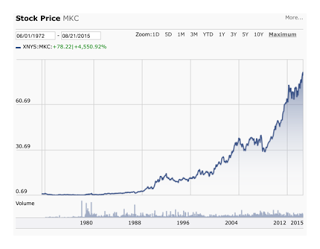Money and Finance
The wild gyrations in markets brought to mind a mindless species - sardines. Specifically, the story that Seth Klarman shared:

- 6 Months Later, Still Not The Time For Mccormick
Consumer staples companies typically make for excellent dividend growth candidates. In general, they have rather inelastic demand that doesn't see operations fluctuate with the health of the economy, at least not to the degree that other sectors...
- Now's Not The Time For Mccormick & Company, Inc.
I mentioned in my dividend growth checkup that my plan for the year was to allocate less capital to the consumer staples due to their general overvaluation. However, that doesn't mean that I won't identify excellent companies with large moats...
- You Don't Know Who Is Drilling Naked Until The Tide Goes Out
Given the grim near term outlook in energy, @PlanMaestro asked a prescient question a few weeks back: This story has a personal angle for me, because some years ago I used to own Seadrill shares. I liked the overall business model which was the leader...
- High Yield Reads - 5/10/14
Summary of recents posts and pieces of interest, sometimes enduring, to investors: Bill Mann of Motley Fool Funds - Wandering Fools: Arabian Gulf - on UAE, Dubai, Oman and more. "The United Arab Emirates and Qatar rank just below Japan and above South...
- Dividend Compass Match 6- Mccormick Spice Vs Wal-mart
In Match 5 is TIm Horton's squeaked by McDonald's. In Match 6, we have to answer the question - is it better to invest in a company with products sold at Wal-mart or invest in Wal-mart directly? The answer will determine who goes on to the next...
Money and Finance
To Sleep Well at Night Buy Businesses Not Sardines
The wild gyrations in markets brought to mind a mindless species - sardines. Specifically, the story that Seth Klarman shared:
“There is an old story about the market craze in sardine trading when the sardines disappeared from their traditional waters in Monterey, California. The commodity traders bid them up and the price of a can of sardines soared. One day a buyer decided to treat himself to an expensive meal and actually opened a can and started eating. He immediately became ill and told the seller the sardines were no good. The teller said, “You don’t understand. These are not eating sardines, they are trading sardines.” Like sardine traders, many financial-market participants are attracted to speculation, never bothering to taste the sardines they are trading.”
People freaking out about prices is not new. But these people have the wrong end of the stick. The whole point of investing is that you are a business owner. Being an owner means having the fortitude to hold through cycles to achieve long run excess returns.
The headlines are predictably apoplectic, but context is severely lacking. Let's say you own McCormick Spice, the world's number one spice maker with sales all across the globe. They pay a low 2% yield but they grow it each year and raised it by around 2.5x in the last decade. Its reasonable to assume there are decades of growth ahead of McCormick. After all, people love spices and the origin of the stock market all the way back to the Dutch East India company. That shows you the longevity of people's taste for spice.
Just like pretty much everything else, McCormick shares traded down over the last few trading sessions. McCormick now sells for $77/share. About a week ago the shares were around $84/share. Examples like that are what makes people panic. But should they?
$84 was an all time high for McCormick. So at today's price we are talking a 10% discount to an all time high. How many business owners would readily give up their company which has excellent, long run sustainable demand just because it was valued 10% lower than a week before?
Zooming out is usually a good idea in situations like this, here is a long run chart for McCormick

Gee that does not look too bad.
If you invested $1,000 in McCormick Spice in 1995, you would have $12,183 today. Its compounded at 13.2%. No genius insight required, just the idea that people like spice. Sure the market can get spicy at times too, but that is not a reason to run for the exits if you like the companies you own.
- 6 Months Later, Still Not The Time For Mccormick
Consumer staples companies typically make for excellent dividend growth candidates. In general, they have rather inelastic demand that doesn't see operations fluctuate with the health of the economy, at least not to the degree that other sectors...
- Now's Not The Time For Mccormick & Company, Inc.
I mentioned in my dividend growth checkup that my plan for the year was to allocate less capital to the consumer staples due to their general overvaluation. However, that doesn't mean that I won't identify excellent companies with large moats...
- You Don't Know Who Is Drilling Naked Until The Tide Goes Out
Given the grim near term outlook in energy, @PlanMaestro asked a prescient question a few weeks back: This story has a personal angle for me, because some years ago I used to own Seadrill shares. I liked the overall business model which was the leader...
- High Yield Reads - 5/10/14
Summary of recents posts and pieces of interest, sometimes enduring, to investors: Bill Mann of Motley Fool Funds - Wandering Fools: Arabian Gulf - on UAE, Dubai, Oman and more. "The United Arab Emirates and Qatar rank just below Japan and above South...
- Dividend Compass Match 6- Mccormick Spice Vs Wal-mart
In Match 5 is TIm Horton's squeaked by McDonald's. In Match 6, we have to answer the question - is it better to invest in a company with products sold at Wal-mart or invest in Wal-mart directly? The answer will determine who goes on to the next...
